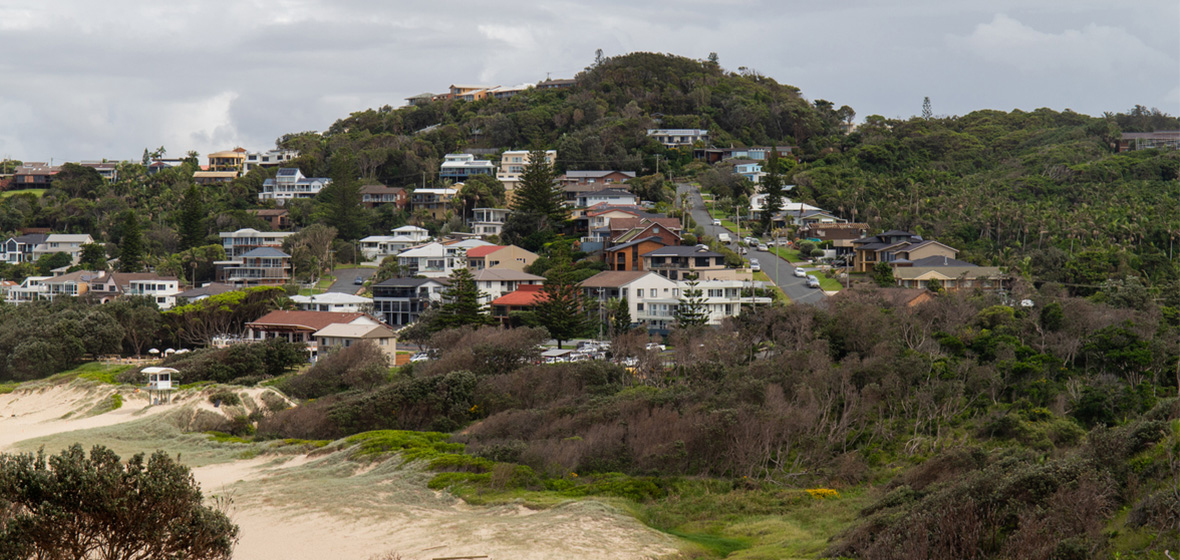Taking up the role of principal solicitor with Legal Aid at Port Macquarie has been a professional and personal journey back home for Emma Smallwood.
Born and raised in the picturesque hub of the NSW mid-north coast, the mother-of-two and passionate legal assistance practitioner has come “home” to serve the community that gave her both a grounded childhood and a love of the law.
Smallwood sees growing up in a regional coastal as a gift, one she’d like to be able to give in turn to her own children. When the opportunity came up at the Legal Aid office in her hometown there was a sense of planetary alignment. She didn’t hesitate to pack up her family and leave the city of Melbourne behind for the golden beaches of one of NSW’s favourite regional destinations.
A natural progression
The progression is a natural one, giving her the chance to pursue her passion for “giving back” to community.
“Since leaving university, I’ve always worked in the legal assistance sector, which I love. I worked at the Victoria Legal Aid Commission for a long time, and now to be back in NSW at Legal Aid – an organisation I believe in so much and about which I feel passionate and deeply connected – and in my own community – feels so right,” she says of heading up the Legal Aid office at Port Macquarie, where the team of lawyers does “some really difficult work”.

Smallwood cut her teeth working in the Women’s Legal Service in Victoria. “Being a legal aid solicitor is a really challenging job some days,” she says. “And in a regional area I think there are additional challenges, but already, in my short time in this role, I’ve witnessed our brilliant solicitors doing that difficult job and it’s inspired me all over again.”
Applying the experience she’s gained in the legal assistance sector to her home ground has fanned a fire in Smallwood’s belly that first ignited when, as a public-school student at Port Macquarie, Smallwood was introduced to debating. It was a discovery that led her in an unusually straight line to a career in law.
“As kid I had a keen sense of right and wrong, an innate sense of justice. Then at school I found debating, and that was really the pathway for me. I just loved it. The idea of thinking on your feet and being persuasive, and the high you get from that moment, was just awesome. I just wanted to find a way to do that for a job,” she recalls, adding that, coming as she does from a “proudly working-class family”, it wasn’t a family calling that brought her to the law.
“I wasn’t surrounded by lawyers. But I found debating and realised I had to figure out a way to do this as a job. The rest is history.”
‘I found debating and realised I had to figure out a way to do this as a job. The rest is history.’
Smallwood’s is a history populated by experiences that, while varied, are all underpinned by a devotion to legal assistance. This devotion has brought her not only great professional satisfaction, but also several illustrious industry accolades.
A dream job
Smallwood worked briefly in private practice, but soon after being admitted as a lawyer she began her search for the opportunity to work in legal assistance, realising from the outset that helping people was her raison d’être for being in the legal profession.
“When I landed the role at Women’s Legal Service Victoria, it was a dream job. I couldn’t believe I got it. I loved it,” she says of what she recalls as “an amazing place for a young, keen graduate to work.”
“I was in court almost every day, on the duty list in either the family court or Melbourne Magistrate’s Court, helping women as a duty lawyer. There’s that real sense of achievement in that you’re helping someone who is possibly having the worst day of their lives. They’re in acute need and you have skills you can apply to provide immediate relief of the stress of being in court without representation.”
Even years later, Smallwood gushes infectiously about her love for that first real taste of advocacy that stirred a passion for her work, and ultimately saw that passion recognised by the wider legal industry.
“I loved that job. I loved helping people. I thought back then that I would probably go to the bar because that environment felt so satisfying to me. Then I got to advance my family law skills, and I was nominated for the Women in Law Young Gun of the Year award. Eventually I was awarded the Law Institute of Victoria Community Lawyer of the Year award in 2016,” she recalls of “an exciting but surreal moment” in her then relatively short career.
“To be acknowledged by everyone in the legal sector made me feel like the work we were doing in Legal Aid and in the Women’s Legal Service was really important.”
Stepping stones to greater support
At the same time as working full time at in-court advocacy, Smallwood was devoting her considerable energy to a research project for the Women’s Legal Service, called Stepping Stones.
“It was really one of the first big pieces of research to talk about economic abuse through the lens of the family law and family violence legal systems in Victoria,” she says of the report on which she and others worked for years, and which ultimately made several law reform recommendations.
“Some were adopted eventually, which is really gratifying, but through that role I also began to branch out beyond in-court advocacy and understand the systems at play and look through a more systemic lens at the problems faced by the women I was helping on a day-to-day basis.”
From that perspective, she says, it became clear that many of those problems were similar, often stemming from the same root cause and indicating that similar systemic solutions could be found.
The launch of the Stepping Stones report, which took place at the Victorian Parliament alongside renowned family violence survivor and campaigner Rosie Batty and other high-profile advocates, was another exciting time in Smallwood’s career.
“After a number of years as duty lawyer, although it is really satisfying work on an individual level, when you see people come through with the same kind of problems you start to feel frustrated that there’s not a more high-level solution.”
Stepping Stones has contributed to “a huge amount of progress” in terms of support services for victims of family violence, according to Smallwood, who has seen vast improvement since the time she first began “duty lawyering” – a time when there was minimal support on offer as part of the legal service.
“Now it’s business as usual to have support services embedded with a lot of those legal duty lawyer services. Even through my career, I’ve been able to see a huge change in terms of recognition of what really vulnerable clients need.”
‘Now it’s business as usual to have support services embedded with a lot of the legal duty lawyer services. I’ve been able to see a huge change in terms of recognition of what really vulnerable clients need.’
Now, holding the reins in Port Macquarie’s Legal Aid office, Smallwood is seeing first-hand some of the challenges inherent in practising in a regional area, particularly in terms of access to service.
Being the most brilliant version of a lawyer
“There are sometimes fewer services for a start, but there’s also less public transport, although COVID-19 certainly opened new avenues to access for clients, like video and telephone services.
“Here on the mid-North Coast, we’ve also had a range of specific challenges in terms of bushfires and floods on top of the pandemic. Regional communities face those ranges of environmental disasters and specific challenges, and that’s why locally based legal aid offices are well placed to understand what the community needs, and make those changes.”
While as a lawyer Smallwood recognises some of the challenges presented by working in a non-metropolitan area, as a mother, she is also acutely conscious of the benefits in terms of that elusive work-life balance.
“Here we have the beach right at our doorstep and I’m able to really connect with nature as a way to regulate myself when I’ve had a difficult time at work. That was one of the natural drawcards for me coming back,” she says, explaining that a coastal childhood gave her many opportunities to “be in nature and use that as a way to learn to regulate”.
“I want to give my kids that option. It’s a real advantage of living regionally. You can walk on the beach or in the bush. Life is a bit more geared towards being outdoors, which I think is just such a good natural de-stressor.
“As a lawyer, especially working with disadvantaged people who often have quite traumatic stories and legal issues, you need to make a conscious effort to build things into your day and life to help you de-stress,” says the mother of two very small children, who ensures each day starts early with exercise before work.
“That’s been a total game changer for me. Unfortunately, it’s something I only realised as I got older and post-children!”
It’s one small piece of a larger serving of wisdom Smallwood would like to offer those considering a career in the family law or legal assistance sectors.
“It can be a tough job, so being realistic from the beginning is helpful in terms of delivering high quality legal services as well getting job satisfaction from doing something meaningful that helps the community. To do that, you need to look after your own needs as well.”
Smallwood reflects that, early in her career, amid the excitement of being in court every day, the first stirrings of talk about vicarious trauma and self-care were dismissed as decadent.
“I naively thought taking care of myself would be self-indulgent. I thought, ‘Here we have these really distressed clients who have had awful things happen; we need to prioritise their wellbeing. Any time spent thinking about our own wellbeing is a waste of time and resources’. I was wrong. I know that now.”
Smallwood thanks her time at Legal Aid for opening her eyes to the importance of personal wellbeing in the delivery of effective legal practice.
“If we don’t look after ourselves, our lawyers and our teams, and we’re not alert to signs of burnout and vicarious trauma, we’re not really helpful to anyone. Part of delivering the highest quality service and being the most brilliant version of the lawyer you can be is to look after your wellbeing.”
Her hope is that it doesn’t take the coming cohort of legal practitioners as long as it did for her to learn that truth.
“I hope that’s built into their experience already so they can hold the two things together and realise they’re related – that it’s not a zero-sum game of needing to spend your time looking after clients and not leaving time to look after yourself. You actually need to do both in order to be effective.”




